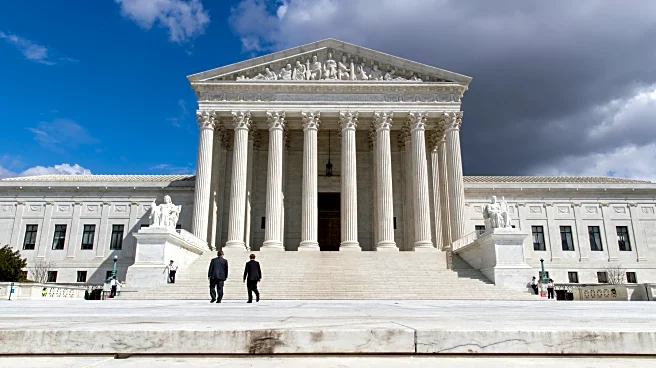WASHINGTON (AP) — Two prominent Republicans on Capitol Hill want the Supreme Court to allow a lawsuit to proceed against tech giant Cisco over allegations that the company’s technology was used to persecute
members of the Falun Gong religious sect in China.
In a Wednesday letter to the Trump administration’s top Supreme Court litigator, D. John Sauer, Reps. Chris Smith of New Jersey and John Moolenaar of Michigan urged the administration to side with the Falun Gong plaintiffs and press the court to allow the lawsuit to go to trial.
Smith co-chairs the Congressional-Executive Commission on China, while Moolenaar is the chairman of a special China committee set up in the House of Representatives — and both are prominent critics of Beijing's human rights record. The letter cited an AP investigation last month that showed American tech companies to a large degree designed and built China’s surveillance state, saying it “underscore(s) the need to deter American firms from supplying technology to facilitate the CCP’s human rights abuses.”
The decision ultimately rests with the Supreme Court whether to hear the challenge brought by Cisco arguing that U.S. law does not permit such a suit. But as part of considering the case the court sought the views of the solicitor general, who represents the U.S. government's position in oral arguments and proceedings.
The Trump administration's view on the case will also be of interest to the court because Cisco has argued that the case involves U.S. foreign relations and should be dismissed on those grounds. The solicitor general is expected to file a brief later this year or early next year.
“The allegation that an American tech company custom-designed a tool to facilitate the violent persecution of a religious minority by the Chinese Communist Party (CCP) is a serious one,” the two lawmakers wrote in a letter to Sauer. “We believe the Plaintiffs deserve the chance to prove their claims.”
“We have a longstanding commitment to uphold and respect human rights for all people and if the 2023 ruling of the Ninth Circuit Court stands, it opens the floodgates for suits against U.S. corporations merely for legal exports of off-the-shelf goods and services,” said a spokesperson for Cisco.
The case has a long and winding history dating back more than a decade.
In 2008, documents leaked to the press showed Cisco saw the “Golden Shield” as a sales opportunity, quoting a Chinese official calling the Falun Gong an “evil cult.” A Cisco presentation reviewed by AP from the same year said its products could identify over 90% of Falun Gong material on the web.
Other presentations reviewed by AP show that Cisco represented Falun Gong material as a “threat” and built out a national information system to track Falun Gong believers. In 2011, Falun Gong members sued Cisco, alleging the company tailored technology for Beijing that they knew would be used to track, detain and torture believers.
The issue before the Supreme Court is whether an American company can be held liable under two separate laws for aiding and abetting human rights violations. Cisco argues it isn’t liable under those laws, the Alien Tort Statute (ATS) or the Torture Victim Protection Act (TVPA), but a federal appeals court rejected the company's arguments in 2023, allowing the case to continue. Now Cisco is asking the Supreme Court to throw out that ruling and stop the lawsuit.
In recent years, the Supreme Court and presidential administrations of both parties have been skeptical of lawsuits seeking to use U.S. courts as a venue to seek justice over the acts of foreign governments, especially those that took place abroad. In the case of Cisco, the Falun Gong members have argued that a substantial portion of Cisco’s activities involving China took place in the United States.
An AP investigation this week found that the U.S. government across five Republican and Democratic administrations repeatedly allowed and even actively helped American firms to sell technology to Chinese police and surveillance companies, even as activists warned such tools were being used to quash dissent, persecute religious sects and target minorities.
Going into the long-heralded meeting Thursday between leaders Donald Trump and Xi Jinping, the sale of U.S. technology to China has been among the thorniest issues the U.S. faces, with billions of dollars and the future of tech dominance at stake. Trump said after the meeting that China will speak with Silicon Valley chipmaker Nvidia about purchasing their computer chips.
Debate over the sale of technology to China has grown heated, with some arguing for a harder stance.
American companies have pushed back against restrictions, arguing it will push China to develop its own domestic supply and strengthen its position in the global race for leadership in artificial intelligence.
But many national security experts say selling such technology could assist China’s military and intelligence services. The plaintiffs’ lawyers make a similar case, citing Cisco marketing materials in China that promoted routers for use in tanks.
If the Cisco suit is successful, it would signal that American companies can be held liable in some circumstances for abuse of their technologies overseas.
—-
Kang reported from Beijing and Tau reported from Washington. AP writer Mark Sherman contributed to this report from Washington.
—-
Contact AP’s global investigative team at Investigative@ap.org or https://www.ap.org/tips/









